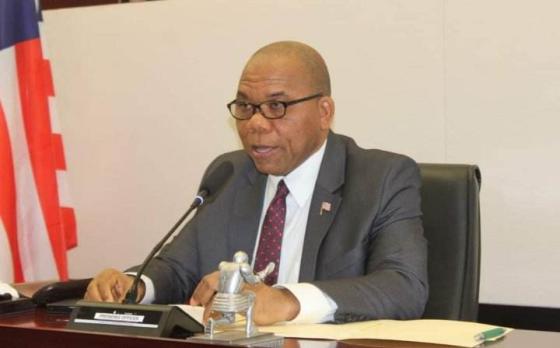Liberia: Sen. Pro-Temp Blames LISGIS for Lack of “District Demarcation”

Senate Pro-Tempore Albert Tugbe Chie presided over the Senate’s decision, which was made on Tuesday, September 5, at the conclusion of the Special Legislative Session called for by President Weah.
…. “The census final report came around the end of June… As a result, he said it was too late for demarcation of constituencies,” Chie said on Monday in an interview with reporters.
Senate Pro-Tempore Albert Chie has disclosed that the 54th Legislature will not carry out the crucial task of demarcating electoral districts for the October 10 polls.
The Senator’s announcement comes as more than half of the Legislature’s members, including himself, are up for reelection. There are concerns among the public that there is a fear among lawmakers — particularly representatives — that any district may potentially have an impact on them.
But Chie denied such and blamed the Liberia Institute of Statistics and Geo-Information Services (LISGIS) for submitting the census report late, which he claimed hindered the timely completion of district demarcation.
He added that the situation left the Legislature with insufficient time to carry out the necessary redrawing of electoral boundaries.
“The census final report was submitted to the Legislature around the end of June,” Chie said on Monday in an interview with reporters. "As a result, he said it was too late for it to be used to set up a threshold for the demarcation of constituencies for the October 10, elections.
“The Senate Ad-hoc committee on the Census Report will continue its work with the aims of establishing demarcation for 2029 elections,” the Grand Kru County Senator said.
His remarks come a few months after some Representatives became jittery for fear of losing their strongholds in their respective constituencies if changes occurred to electoral distric boundaries.
The LISGIS census bends lawmakers’ hands to “readjusted” electoral districts to reflect changes in Liberia's population distribution, but they may not — in violation of the Constitution — which mandates such.
Chie's announcement also comes just weeks after the House has mandated LISGIS to provide a breakdown of the country’s population by electoral districts.
The House’s decision came following LISGIS’ submission of the final report of the 2022 Census, which shows that Liberia’s population increased by almost two million, with Montserrado and Nimba counties accounting for nearly half of the national population.
The district report, as being requested by the House, is aimed at getting a detailed breakdown of the country’s population by electoral districts, which would aid in the pending demarcation.
The House is of the view that a segregated report will facilitate targeted development initiatives and resource allocation at the ‘district level’.
According to LISGIS, the current population for Liberia stands at 5.2 million, an increase of 50.4 percent when compared with the 2008 census result of 3.5 million.
This represents a population gain of over 1.7 million people in the space of 14 years with urban growth up by 52 percent, while rural growth is down by 48 percent.
The data also shows that 50.4 percent of the country’s 5.2 million people are male, while 49.6 percent are female — giving a national sex ratio of 101.5 males for every 100 females.
It is the same as the 2008 census result, where the female population was 49.4 percent compared to 50.6 percent for males. This resulted in a sex ratio of 102.3, which was the same in 1984.
Estimates for each county showed that Liberia’s population remained heavily concentrated in four counties — Montserrado, Nimba, Bong, and Lofa County.
These counties constitute nearly two-thirds or 65 percent of the total population — following a similar pattern in 2008 — which could inform many long-term national projections.
The counties sharing the least population distributions are Rivercess, Gbarpolu, Grand Kru, and River Gee. These counties are among the poorest in the country, lacking basic social services, fueled by decades of government neglect.
